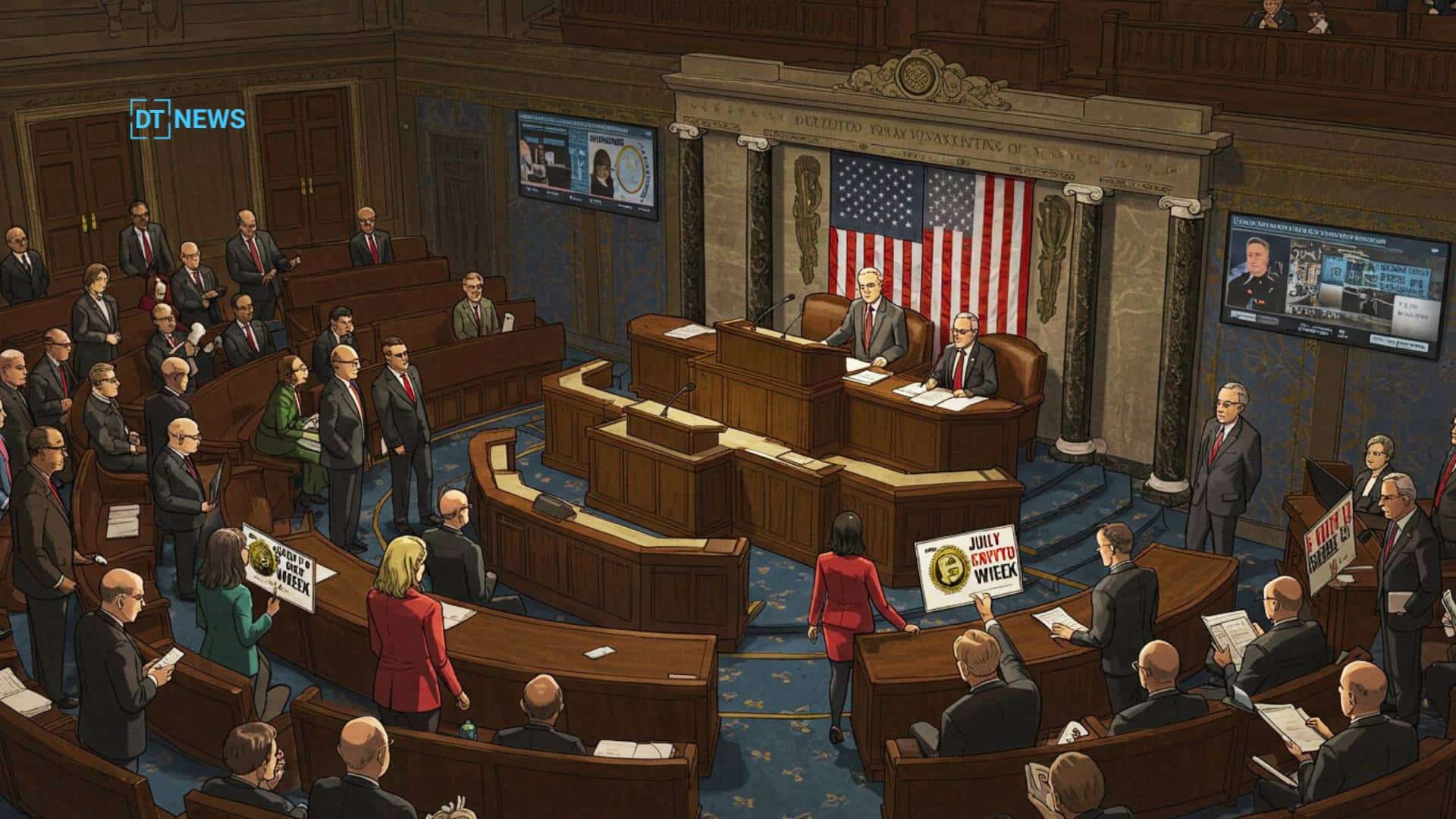Lawmakers in the U.S. House of Representatives have declared the week beginning July 14th as “Crypto Week.” The move signals Congress’s intent to pass landmark legislation on digital assets. This week will center on three major bills: the CLARITY Act, the GENIUS Act, and the Anti-CBDC Surveillance State Act.
- CLARITY Act Splits Crypto Oversight Duties
- Stablecoin Oversight Advances During Crypto Week
- Preserving Americans’ Financial Privacy and Autonomy
- FAQs
- What is Crypto Week?
- Which bills will be discussed?
- Why is Crypto Week significant?
- Who will regulate cryptocurrencies?
- Will the U.S. launch a digital dollar?
- Glossary of Key Terms
The bills are an organized effort to put crypto assets under clear-cut frameworks. The act focuses on solving historically contentious claims and protecting investors. This trend can be explained by years of uncertainty that have affected U.S. crypto innovation and compliance.
Crypto Week is expected to influence both the domestic regulatory climate and global competitiveness. It addresses oversight clarity, stablecoin integration, and the digital dollar debate. Industry observers expect increased activity and confidence during this pivotal legislative window.
CLARITY Act Splits Crypto Oversight Duties
The CLARITY Act proposes a clear split in regulatory oversight between the SEC and CFTC. Based on use and design, it categorizes digital assets as securities, commodities, or stablecoins. This classification allows agencies to supervise only the assets they are best equipped to regulate.

The bill gives the CFTC complete control over digital commodities such as Bitcoin. Meanwhile, the SEC would continue regulating tokenized securities and enforcing compliance. A dual-track registration system would let firms register with the appropriate agency.
This approach provides certainty for entrepreneurs, reducing regulatory risks and legal conflicts. It also protects consumers through mandatory anti-fraud provisions. Supporters argue it will attract compliant innovation back to U.S. soil.
Stablecoin Oversight Advances During Crypto Week
The Senate-passed GENIUS Act lays out a federal framework for payment stablecoins. It sets issuance conditions, capital reserves, and audit obligations for stablecoin issuers. Under the new rules, both state and federal regulators will have supervisory authority.

The Act aims to stabilize and legitimize dollar-backed stablecoins in the financial system. It provides the foundation for safe adoption by businesses and consumers and reinforces the dollar’s influence in digital commerce and payments.
The Act also addresses concerns from banks and fintech companies by offering clear compliance paths. It provides guidance for issuance and use across jurisdictions. Many see it as a step forward for mainstream adoption and digital-dollar competition.
Preserving Americans’ Financial Privacy and Autonomy
The Anti-CBDC Surveillance State Act would prevent the Federal Reserve from issuing a retail Central Bank Digital Currency. It addresses concerns that a government-backed CBDC could allow financial surveillance. This measure reflects growing public unease over digital privacy rights.
The bill bars both direct and indirect issuance of a CBDC to individual Americans. Lawmakers backing it believe it defends privacy and economic freedom. The proposed law also encourages the private sector to develop decentralized payment alternatives.
Crypto advocates argue that this law is essential to preserving innovation and user sovereignty. They cite international examples of state digital currencies expanding government oversight.
“The next few weeks are going to be really bullish for the crypto market,” said trader Cas Abbe.
The next few weeks are going to be really bullish for the crypto market.
🇺🇸 US House has designated July 14-18 as "crypto week".
During this week, 3 crypto-related bills will be under review.
1️⃣ GENIUS Act: A bill to establish a federal framework for regulating stablecoins.… pic.twitter.com/KI8SMk5CtQ
— Cas Abbé (@cas_abbe) July 4, 2025
Summary
During Crypto Week, beginning July 14, the U.S. House will consider three key crypto bills: the CLARITY Act, the GENIUS Act, and the Anti-CBDC Surveillance State Act. These laws aim to define regulatory roles, support stablecoin frameworks, and protect financial privacy. Together, they represent a critical step in shaping the United States’ position in the global digital asset sector.
FAQs
What is Crypto Week?
Crypto Week is a legislative initiative starting July 14, where Congress will review key bills on digital asset regulation.
Which bills will be discussed?
Lawmakers will consider the CLARITY Act, the GENIUS Act, and the Anti-CBDC Surveillance State Act.
Why is Crypto Week significant?
Crypto Week may define how the U.S. regulates crypto assets, affecting global finance and national digital strategy.
Who will regulate cryptocurrencies?
Under the CLARITY Act, the CFTC will handle commodities like Bitcoin, while the SEC will oversee securities.
Will the U.S. launch a digital dollar?
The Anti-CBDC Act aims to prevent any such issuance, citing privacy and government overreach concerns.
Glossary of Key Terms
CLARITY Act – A bill that defines roles for the SEC and CFTC in regulating crypto assets.
GENIUS Act – Senate-approved legislation creating rules for payment stablecoins.
Stablecoins – Digital tokens pegged to the U.S. dollar or other fiat currencies.
CBDC – Central Bank Digital Currency issued and controlled by a government entity.
CFTC – Commodity Futures Trading Commission, responsible for regulating derivatives and commodities.





































































































![BitTorrent [New]](https://s2.coinmarketcap.com/static/img/coins/64x64/16086.png)













